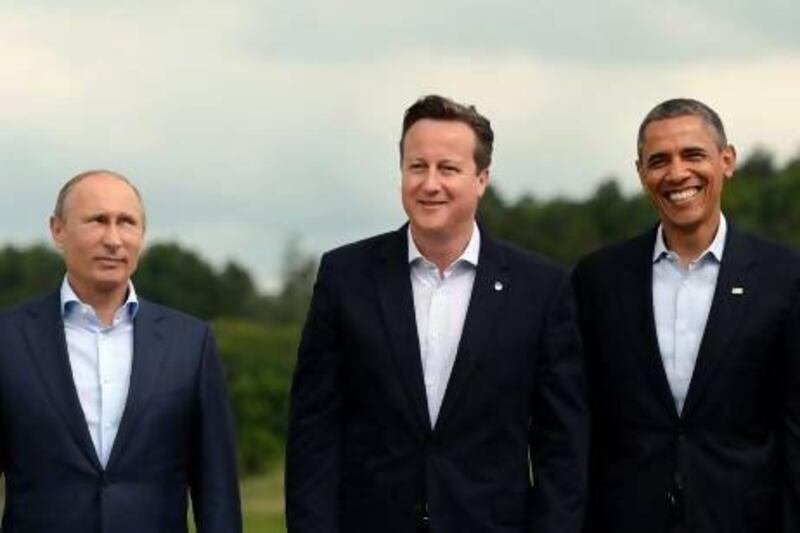LONDON // Leaders of some of the world's most powerful countries yesterday pledged to organise peace talks as soon as possible to end Syria's civil war, but avoided any mention of president Bashar Al Assad's fate at Russia's insistence.
The final communique issued by G8 leaders after a two-day summit in Northern Ireland also addressed issues as diverse as overcoming barriers to trade, international tax evasion and global government transparency.
Syria's bloody conflict overshadowed proceedings at the Lough Erne luxury resort, even if it took up a relatively modest six points in the 24-page communique issued yesterday.
Notably, the six points do not mention Mr Al Assad by name, after the Russian president, Vladimir Putin, on Monday refused to countenance any peace process that had the Syrian president's departure as a precondition.
Russia has been one of the Syrian leader's strongest supporters during a two-year conflict that has claimed at least 93,000 lives and displaced millions, according to the United Nations.
G8 leaders did agree to "strongly support" a peace conference in Geneva to start a process that includes a "transitional governing body with full executive powers" before reaching the aim of a "united, inclusive and democratic Syria".
They also agreed that the Syrian government should allow access for a UN investigation into claims that the Syrian army had used chemical weapons.
But without any direct mention of Mr Al Assad, the final wording fell short of the kind of statement Britain, the US and France may have been hoping for. David Cameron, the British prime minister, said the mere fact that the eight leaders agreed on a joint position, and that it talked of a political transition meant they had succeeded in "turning up the pace of political change that is needed in Syria".
Moreover, Mr Cameron said at a news conference yesterday, it was "unthinkable" that a stable and united Syria could emerge with Mr Al Assad still in power.
Mr Putin, however, who has clashed repeatedly with other leaders at the summit over Syria, was unrepentant. He vowed that Moscow would fulfil weapons contracts it had with Damascus and said the West should think "very carefully" before arming the Syrian opposition.
He drew a direct line between the Syrian opposition and the accused killers of a British soldier on a London street last month, saying many of them were "exactly the same".
"If we equip these people, if we arm them, what is going to control and verify who is going to have these weapons, including in Europe as well? So we call all our partners, before making this dangerous step, think about it very carefully."
He also said that Moscow remained unconvinced that there was proof the Syrian army had used chemical weapons - the reason cited last week when the White House announced that the US would start arming Syrian rebels.
Mr Putin and Barack Obama, the US president, had met privately late on Monday, but failed to reconcile what Mr Obama called their "differing perspectives".
Almost lost amid the focus on Syria - an issue not even on the official agenda - G8 leaders also agreed to work for stronger oversights on global taxation, committed to establish an automatic exchange of information between tax authorities and building a multilateral model to identify and punish tax evaders.
The issue of tax evasion was a focus of charities and anti-poverty activists in the run-up to the summit, but the final agreement fell short of what some would have liked to see.
The G8 - Britain, the US, Russia, France, Germany, Italy, Japan and Canada - may have asked the right questions, said Jim Clarken, the executive director of Oxfam, a leading UK charity for developing countries, but the agreement does not go far enough.
"The G8 has woken up and smelled the coffee but has failed to agree a tax deal that helps the poorest countries."
Mr Clarken did welcome as a "bold move", however, agreement to improve global government transparency, including better reporting of land ownership.
He was less positive about free-trade agreements, which the G8 vowed to pursue in an attempt to break down barriers to trade.
"Unequal and exploitative free-trade agreements and bilateral investment treaties, which prohibit the very policies developing countries need to fight poverty, put the prospect of a fairer world in jeopardy."
It was announced on Monday that the US and EU would begin negotiations next month to thrash out a free-trade agreement by the end of next year worth a potential US$100 billion (Dh367bn) a year to the two regions.
twitter: For breaking news from the Gulf, the Middle East and around the globe follow The National World. Follow us






